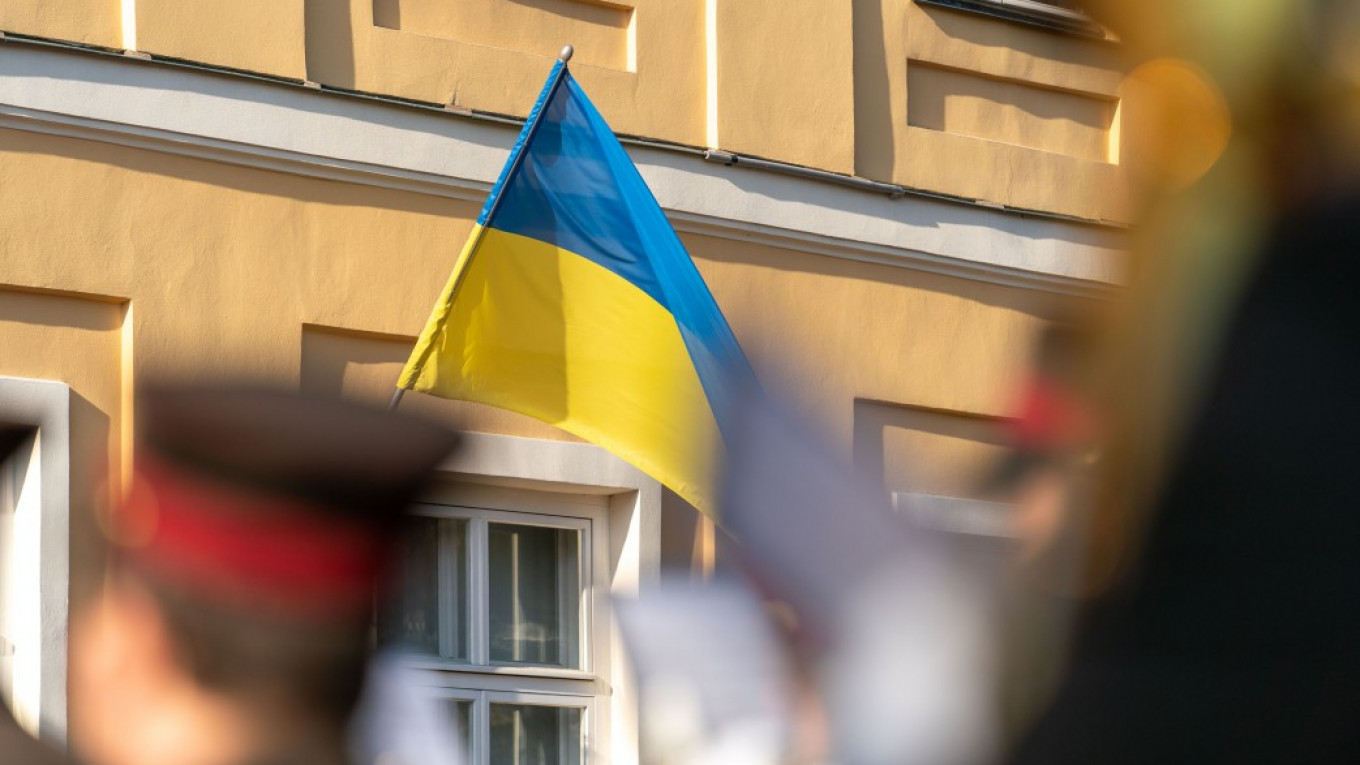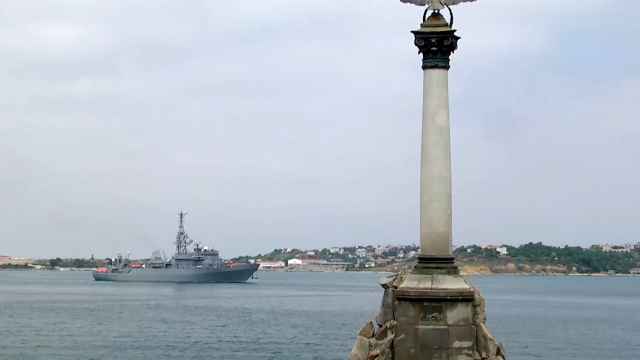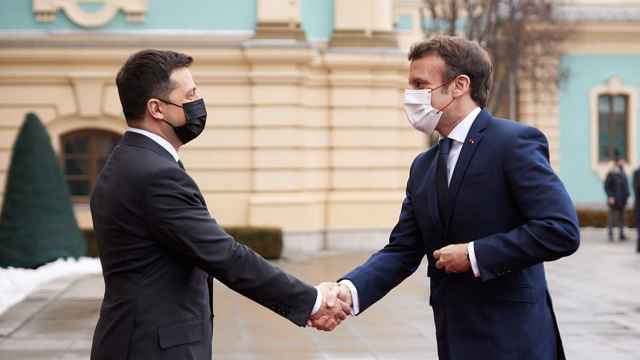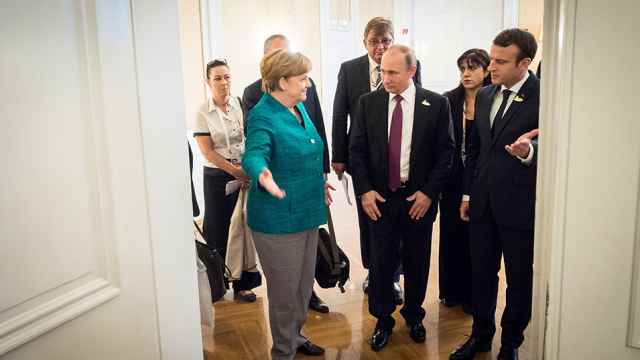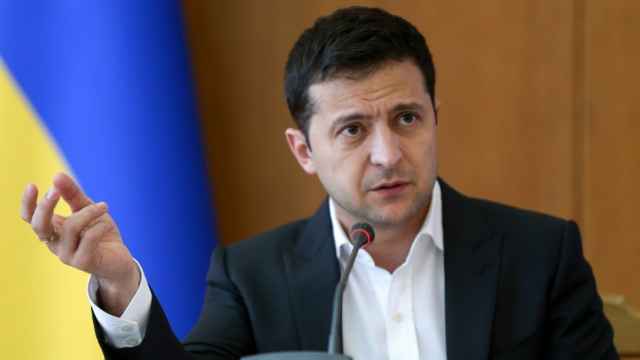Under constant pressure from protesters who fear a “surrender” to Russia, the government of Ukrainian President Volodymyr Zelenskiy is laying out what it calls its red lines in peace talks on eastern Ukraine. A number of these are hard for Russia to accept, but that doesn’t mean the peace process is doomed.
Unlike in the last three years or so, both sides actually want to end the conflict, and share the goal of having the Kiev government re-establish sovereignty over the regions in eastern Ukraine now held by pro-Moscow separatists. The question that any further talks must settle is to what extent Russia will be able to maintain its influence in the area, known as the Donbass. That’s a gray area in which reality is likely to defy any formal red lines.
Zelenskiy, predictably, got into trouble at home after Ukraine accepted a key Russian demand — that it approve the so-called Steinmeier formula, proposed by German President Frank Walter-Steinmeier in 2016, when he was his nation’s foreign minister. The formula says the separatist-held areas should get a special autonomous status under Ukrainian law immediately after the Organization for Security and Cooperation in Europe recognizes the outcome of a local election.
These sequence’s opponents include Zelenskiy’s predecessor, Petro Poroshenko, and the well-armed veterans of the east Ukraine war. They say an election is only possible after Russia restores to Ukraine the control of its eastern border. For the Kremlin, this condition means Ukrainians may try to arrest its supporters in eastern Ukraine before the election — and before they’re subject to an amnesty stipulated in Ukraine’s law on the east’s special status.
Zelenskiy could have ignored protests in Kiev and other Ukrainian cities. Though his popular support is dropping — a recent poll shows it at 66%, down from 73% in September — his desire for peace in the east remains overwhelmingly popular. But Ukraine is a country at war, and veterans are a powerful force. Some of them proved that by effectively scuppering an agreed pullback of both Russian and separatist troops near the village of Zolote.
Led by a nationalist former legislator, they have inserted themselves between the Ukrainian and separatist troops, saying they were there to prevent a Russian takeover of the territory that regular Ukrainian forces had been ordered to leave. Zelenskiy refused to remove them by force, saying persuasion was the better approach. The official reason Ukraine has halted its troop withdrawal is that the separatists haven’t ceased fire.
Vladislav Surkov, the Kremlin official in charge of eastern Ukraine, has called the mutual pullback at Zolote a precondition for restarting talks with Ukraine in the so-called Normandy format — mediated by Germany and France. Russian President Vladimir Putin and his aides doubt that Zelenskiy can stand up to the domestic opposition to the degree necessary for progress. But Zelenskiy is working to make the pullback happen, and eventually it will.
Meanwhile, Zelenskiy and his foreign minister, Vadym Prystaiko, are trying to reassure both Ukrainians and allies in Europe that they’re not about to hand Putin a veto on Ukraine's future direction by letting him control the east. During a marathon 14-hour news conference last week, Zelenskiy told reporters that his team had “undercommunicated” its position. He has since used every opportunity, including a speech to the military in the east, to insist that no elections will be held in the crosshairs of Russian guns. “Believe me, I’m already getting an allergy to the word ‘capitulation,’ ” he told service members.
At the same time, Prystaiko has traveled to Luxembourg and Brussels to communicate a similar message. He has named three distinct Ukrainian red lines: Eastern territories’ autonomy shouldn’t turn Ukraine, now a unitary state, into a federation; Ukraine won’t change its constitution to incorporate expanded rights for these territories; elections will be held only after all Russian troops are withdrawn, pro-Russian military units disbanded and control of the border handed back to Ukraine.
Darka Olifer, spokesperson for Leonid Kuchma, who was the president of Ukraine for a decade starting in the mid-1990s and now represents the country in preliminary talks with Moscow, laid out the same position in a Facebook post on Tuesday.
This represents unprecedented clarity on where the Zelenskiy administration stands as the sides are trying to agree on a date for Normandy-format talks. At first glance, this clarity isn’t encouraging. Russia has said many times it would reject border handover and disarmament demands because they run counter to the 2015 Minsk agreements, which serve as the basis for the talks. But there has been no official rebuff from the Kremlin to all the Ukrainian publicity concerning red lines.
Russia is the party holding back the final decision on the summit date. It’s deliberately allowing Zelenskiy time for his persuasion campaign while it tries to establish what progress could be possible in the talks. It’s clear, however, that Putin doesn’t want the peace process to lapse; he’s had, and skipped, plenty of opportunities to say that a summit makes no sense, as he’d done in previous years.
Putin is tired of the status quo and the European economic sanctions that come with it. It’s a good moment for moving forward. The U.S. is distracted by its political scandals, the leaders of France and Germany want the Ukraine matter out of the way, and Zelenskiy is eager to keep his electoral promise to end the war.
Putin, an experienced negotiator, also knows red lines can be fudged during actual talks. A formal federation isn’t necessary if some Ukrainian regions are run by Moscow-friendly administrations that Kiev can’t remove. Other compromises also are possible, including the formation of an international peacemaking force to control the border in the run-up to the election. Even disbanding the unrecognized “people’s republics” armed forces is not taboo if they’re allowed to transform into the local police forces allowed by the Minsk agreements.
What’s important for Putin is to make sure Kremlin-friendly forces prevail in the eastern Ukraine election. That would give him enough leverage in a reunited Ukraine to give up the people’s republics. That outcome can be assured by finding a balance between giving Zelenskiy enough control to pacify the domestic opposition but not enough to take the pro-Russian leaders out of the running.
The complex maneuvering makes any kind of quick deal unlikely. But with both sides seeking closure, there’s still some reason for optimism.
This article first appeared in Bloomberg.
A Message from The Moscow Times:
Dear readers,
We are facing unprecedented challenges. Russia's Prosecutor General's Office has designated The Moscow Times as an "undesirable" organization, criminalizing our work and putting our staff at risk of prosecution. This follows our earlier unjust labeling as a "foreign agent."
These actions are direct attempts to silence independent journalism in Russia. The authorities claim our work "discredits the decisions of the Russian leadership." We see things differently: we strive to provide accurate, unbiased reporting on Russia.
We, the journalists of The Moscow Times, refuse to be silenced. But to continue our work, we need your help.
Your support, no matter how small, makes a world of difference. If you can, please support us monthly starting from just $2. It's quick to set up, and every contribution makes a significant impact.
By supporting The Moscow Times, you're defending open, independent journalism in the face of repression. Thank you for standing with us.
Remind me later.



